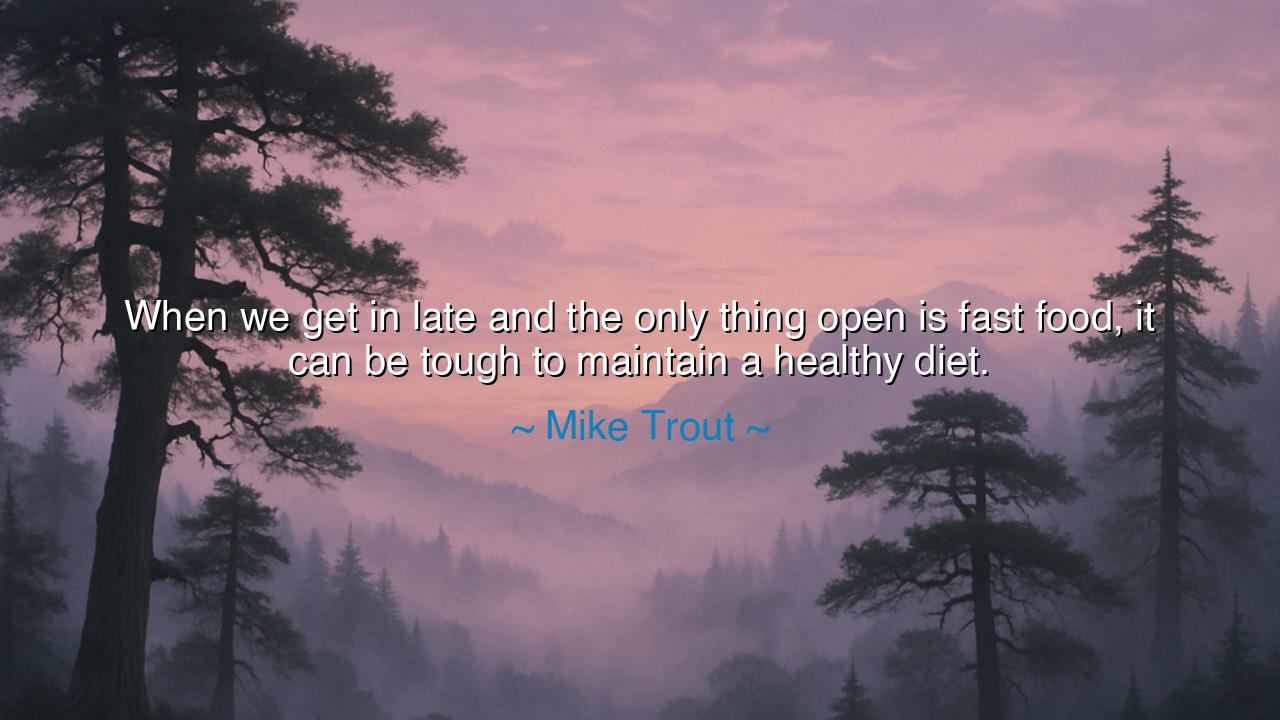
When we get in late and the only thing open is fast food, it can
When we get in late and the only thing open is fast food, it can be tough to maintain a healthy diet.






When Mike Trout said, “When we get in late and the only thing open is fast food, it can be tough to maintain a healthy diet,” he spoke with the honesty of a man who has seen the eternal conflict between convenience and discipline. His words, though simple, conceal a profound truth about the human struggle—the battle not against hunger alone, but against temptation, weariness, and the easy path. For when the body is tired, the will grows weak, and the flame of intention flickers in the wind of fatigue. Trout’s reflection is not just about food—it is about choice under pressure, the measure of a soul when comfort beckons and conviction is costly.
In the world of athletes, as in life, greatness is not forged in the light of day, but in the quiet hours when the world sleeps. When he says, “when we get in late,” he speaks of the weary traveler, the laborer, the competitor who has given all his energy to the day’s toil. In that moment of exhaustion, when hunger speaks louder than reason, the spirit is tested. The ancients knew this struggle well. The philosopher Epictetus warned that virtue is not proven when life is easy, but when the will is weary and the choice is difficult. Trout’s words echo this timeless truth: that the path of health, of discipline, of mastery, is narrowest when the night is longest.
The fast food he mentions is not merely literal—it symbolizes all that is quick, cheap, and convenient in the modern age. It represents the illusion of satisfaction without substance, the promise of ease that exacts a hidden cost. In every age, there has been such temptation. The soldiers of ancient Rome, after long campaigns, would gorge themselves on indulgence when discipline should have been their shield. Their decline, like ours, began not with a single feast, but with the quiet surrender of habit to hunger. The body follows the will, and when the will yields to convenience, the spirit weakens little by little.
Yet Trout’s reflection is not a lament—it is a call to awareness. He does not boast of perfection, nor condemn weakness, but acknowledges the difficulty of balance. This humility itself is wisdom. For even the strongest must guard against complacency, and even the most disciplined must forgive their faltering. The ancient Stoics taught that one must know both their strength and their frailty; that to admit challenge is not to fail, but to stand in truth. Trout reminds us that the pursuit of health is not a single victory, but a lifelong dialogue between desire and restraint.
In his words, there is also the recognition of modern life’s burden—the pace that steals from us the time to nourish ourselves properly. The elders of old ate in rhythm with the sun, their meals aligned with the turning of the earth. But now, in the chaos of schedules and screens, we eat when we can, not when we should. Thus, his quote becomes a lament for a world that has lost its natural order, where the sacred act of eating—once tied to family, soil, and gratitude—has been reduced to speed and survival. It is a reminder that health cannot thrive where haste is worshipped.
Consider the story of Heracles, the hero of labor and endurance. After his labors, he was offered a choice between two paths: one of ease and indulgence, the other of toil and virtue. The first promised pleasure, the second honor. Heracles chose the harder road—and in doing so, achieved immortality. So too does Trout’s message call us to remember that every late night, every hungry moment, every choice before the glowing lights of convenience is our own crossroad. To choose health, even once, is an act of heroism; to choose it often, a way of life.
And so, the lesson to draw is this: discipline does not demand perfection—it demands awareness. When weariness tempts you to settle for less, pause and remember that the body is the temple of your will. Eat with intention, not impulse. Prepare before the moment of weakness, so that choice becomes habit, and habit becomes character. And if, in your humanity, you falter—rise again the next morning with gratitude, not guilt.
For in the end, Mike Trout’s words remind us that strength is not found in denying hunger, but in directing it. The challenge of the late night, the fast meal, the easy choice—these are the modern trials of the spirit. To meet them with mindfulness is to practice the same virtue that guided warriors, monks, and philosophers before us: the courage to choose the long road over the easy one, even when no one is watching.






AAdministratorAdministrator
Welcome, honored guests. Please leave a comment, we will respond soon